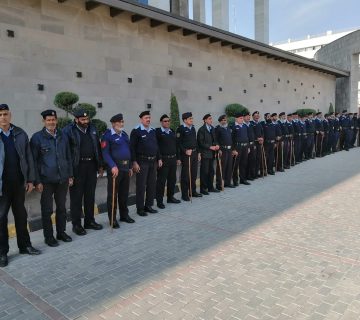ISLAMABAD, June 20: Prime Minister Shehbaz Sharif on Monday reached out to a nearly dozen influential global capitals to sensitise them about Pakistan’s efforts to revive the $6.5 billion bailout package amid wide gaps between Islamabad and the International Monetary Fund over budget figures.
The prime minister held a background meeting with the ambassadors from the Western, European and Asian countries, at least three participants of the meeting. The meeting took place just 11 days before the expiry of the current IMF programme, which could also be the last such interaction.
The prime minister apprised the foreign ambassadors about the efforts that Finance Minister Ishaq Dar and he personally made during the past many months, a participant of the meeting told on condition of anonymity.
The prime minister again showed the interest that the government was keen to get at least the $1.2 billion tranche out of the remaining $2.6 billion, which is attached with the completion of the pending 9th review, said the sources.
The government had invited the ambassadors of the United States, the United Kingdom, France, Germany, the European Union, Japan, China, Saudi Arabia, Qatar and the United Arab Emirates, according to the sources.
Some ambassadors sought clarifications from the government but assured that they would communicate Pakistan’s position to their capitals, according to another participant of the meeting. The ambassadors are also in touch with the IMF staff.
The PM’s Office did not issue any official statement after the meeting.
The sources said that the economic team counted on the efforts that the finance minister first made to invite the IMF team for review talks in October last year, but the IMF took three months to respond to the invite. The foreign diplomats were apprised that in February, the country undertook all the agreed steps, including Rs170 billion worth mini-budget, increase in electricity and gas tariffs, increase in interest rates and leaving the exchange rate at the market forces, according to the officials.
The only outstanding issue was the external financing gap which, according to the finance ministry, was also settled on May 27 during a telephonic conversation between the prime minister and IMF Managing Director Kristalina Georgieva.
But the gaps remain between the positions taken by Pakistan and the IMF, particularly on the issue of amendments in the proposed budget, hike in the monthly stipend of the Benazir Income Support Programme, increase in petroleum levy rates and correction in the foreign currency market.
Pakistani authorities are of the view that the external financing gap has been bridged due to marked improvement in the current account deficit. They said that as against the IMF’s estimates of a $7 billion annual deficit, the deficit was only $2.9 billion during the first 11 months of the current fiscal year.
The central bank also reported on Monday that the current account showed a surplus of $255 million in May. As a result, during the July-May period of the current fiscal year, the current account had only a deficit of $2.94 billion compared to a deficit of $15.16 billion in the same period of the last fiscal year.
Dar takes the credit of drastically bringing down the deficit, which has so far helped to avert the looming default.
However, the official foreign exchange reserves as of Friday were still around $3.5 billion despite the country receiving $1 billion from the China Development Bank. The country made a $300 million Bank of China loan repayment and over a dozen small payments worth $350 million to other multilateral creditors last Friday.
But the sources said that the reserves may jump to $3.8 billion by Wednesday on the back of $300 million Chinese financing that is expected to be received shortly.
The sources said that the prime minister also mentioned his interaction with the IMF managing director, including three letters that he wrote to Georgieva in just less than one month. The sources said that the PM wrote first a letter to the managing director on May 19, then on June 12 after the presentation of the budget and then on June 16th.
The finance ministry sources said that each time, the IMF responded to the letters and presented a counter view about the pending actions that, according to the IMF, Pakistan is still required to take for completion of the 9th review.
In his letters, the prime minister mentioned proper functioning of the foreign exchange market, budget measures and withdrawal of the electricity subsidies.
In response to the letters, the IMF assured that it was also keen to complete the 9th review subject to the fulfillment of the pending actions, according to the finance ministry sources.
They added that the IMF again asked to bring the proposed budget in line with the programme objectives and also withdraw the $100,000 tax amnesty scheme.
The sources said that the IMF has also asked Pakistan to give an inflation-adjusted increase to the 9.3 million beneficiaries of the Benazir Income Support Programme (BISP). The government’s view is that it has already increased the stipend by 25%.
The IMF has also asked the government to increase petroleum levy by Rs10 to Rs60 per liter. The IMF wanted the provinces to provide iron-clad guarantees for generating cash surplus.
According to Bloomberg, non-revival of the IMF programme would cause a severe dollar shortage in the first half of the next fiscal year that starts in July, and possibly for longer — significantly raising the odds of default.
The situation would also raise the prospect of much lower growth, and higher inflation and interest rates than we currently anticipate in fiscal 2024, stated the report released on Monday.
Between July-December, Pakistan must repay an additional $4 billion, which cannot be rolled over, it added. “With FX reserves likely below $4 billion at the start of fiscal 2024, default seems highly likely”.
The report said that negotiations with the IMF on any new bailout aren’t likely to start until after elections in October.




No comment